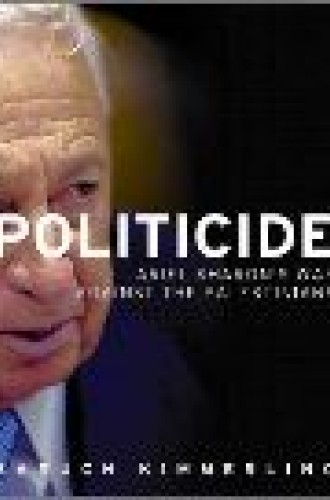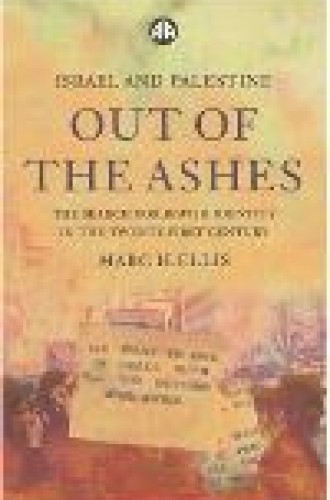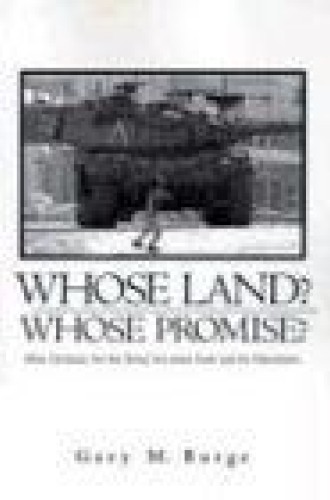Property rights
In announcing his road map to peace in the Middle East, President Bush described Israeli Prime Minister Ariel Sharon as a “man of peace.” Baruch Kimmerling, professor of sociology at Hebrew University in Jerusalem—now working in “temporary refuge” at the University of Toronto—would emphatically disagree. The Sharon that Kimmerling describes, with ample documentation, has all his life been a ruthless man of war who glories in his reputation as such.
In his autobiography, Sharon describes, with evident pride, Henry Kissinger’s comment upon their first meeting: “I hear you are the most dangerous man in the Middle East.” Bush’s “man of peace” is the same man Kimmerling cites as the man “who many consider a war criminal by any standard.”
Sharon is leading Israel in a policy that Kimmerling calls “politicide,” the ultimate goal of which is “the dissolution of the Palestinian people’s existence as a legitimate social, political and economic entity. This policy may also, but not necessarily, include the partial or complete ethnic cleansing from the territory known as the Land of Israel.”
Kimmerling has been denounced as a “self-hating Jew” (a charge also leveled at Marc Ellis), but he regards himself as an “Israeli patriot.” He sees his quarrel with Sharon and the Israelis who overwhelmingly elected him as a fight for the “soul, fate and well-being of Israel and all its citizens, Jews and Arabs.”
It is hard to determine whether Kimmerling is a religious or secular Israeli. There can be no doubt as to the deeply theological intentions of Marc Ellis and Gary M. Burge, though their respective theologies and their primary audiences differ markedly.
Burge, who teaches New Testament at Wheaton College in Illinois, underwent a radical theological conversion on the way to writing Whose Land? Whose Promise? In 1991, buying into the apocalyptic speculations of Hal Lindsey and others, Burge, together with many other evangelicals, was enthusiastic at the outset of the Persian Gulf war. Victory by the U.S. and its coalition, they thought, would further the interests of Israel. And the Second Coming of Jesus awaited the total restoration of the nation of Israel. Thus, “if war means that the second coming of Jesus is approaching, then let the fighting begin! If war means that the eschatological clock will tick a little faster, so be it.”
What followed that “just war” was the death of nearly 250,000 Iraqis, a destroyed Iraq infrastructure and, as an aftermath, the death of as many as 500 Iraqi children per day under UN sanctions. In the light of these horrors, Burge was driven to ask, “Was my commitment to eschatology greater than my commitment to these people whom God surely loved?” He now saw his task to be that of opening the eyes of his fellow evangelicals to the suffering of Arab people, Muslim and Christian.
Burge begins by outlining the geography and history of Israel and Palestine from the biblical period to the present. His narrative becomes more polemical as he comes to Zionism, which he says intended the ethnic cleansing of Palestinians “from the beginning.” Burge, like the other authors reviewed here, recounts the atrocity carried out by Jewish terrorists at the Arab village of DeirYassin just prior to the declaration of the Israeli state in 1948. Over 250 people were slaughtered, and Israeli propaganda spread the news of DeirYassin to other Arab villages as a warning against resistance.
Burge is not insensitive to the fact that Israeli evil has been matched by Palestinian evil or that the state of Israel has fought five wars in the promotion of its security. He does not wish to see Israel destroyed. His very powerful survey of events, which admittedly stresses Israeli atrocities, is designed to show how the American media falsely place all the blame for the tragedy unfolding in Israel/Palestine on Arab terrorism. If it were true that all the evil were on one side, then any appeal to fairness might be seen as making a pact with the devil.
Burge considers the scriptural basis for Zionism. Didn’t God give the land to the Jews? How, Christian Zionists have argued, can one be faithful to scripture and not side with the Zionist takeover of Palestine? As one Christian Zionist has claimed: “God is a biblical Zionist.”
Burge fully acknowledges that God has granted Israel the gift of the land. However, citing a number of proof texts, he argues that the gift is conditional on Israel’s righteousness, one vital test of which is Israel’s treatment of non-Israelites living in the promised land. “When an alien resides with you in your land, you shall not oppress the alien. . . . you shall love the alien as yourself” (Lev. 19: 33-34). Further, in the ultimate sense of ownership Israel is a tenant, not an owner: “The land is mine—with me you are but aliens and tenants” (Lev. 25:23). Behind the blessing of the land there is the grave warning that without righteousness “the land will vomit you out for defiling it, as it vomited out the nation that was before you” (Lev. 18:28).
Burge does not wish to see Israel “vomited out.” He longs to witness the emergence of a “prophetic voice” which will “remind Israel of its higher calling.” However, his understanding of this higher calling is shaped by his Christian understanding of the New Testament.
Burge’s chapter on the New Testament is brief because there is not a great deal to say about the New Testament and the land per se. He quotes W. D. Davies to the effect that Paul’s understanding of God’s redemptive work in Jesus Christ is “a-territorial.” What is true of Paul is true of the whole New Testament, for the New Testament spiritualizes God’s promise to Israel to make a great nation. In the New Testament, the church of Jesus Christ has become the locus of God’s promise. As such, the church is free of racial and national commitments; it makes a universal claim. God’s plan is not defined by the territorial aspirations of Judaism. It involves a vision for all nations throughout the world.
In Burge’s exegesis generally, and in the New Testament section in particular, he is not sensitive enough to the dangers implicit in any universal claim for the ultimate truth of the biblical witness. As a believer in Jesus Christ, I believe that such a claim must be made, but in making it Christians need to be profoundly circumspect.
Burge stresses that the repressive policies of the Israeli government have led to the suffering not just of Muslim Arabs, which ought to be of great concern in its own right, but also of Arab Christians. Christianity is being driven out of the Middle East. The remaining Christians are being “discriminated against, oppressed and imprisoned in their own country.” Where is the support these Christians have a right to expect from fellow Christians? Burge offers 12 brief biographies of Palestinian Christians struggling to keep alive the Christian faith and programs of Christian service. It is very poignant reading.
A disturbing footnote to the story of Zionism: Burge reports that Martin Buber, the great Jewish philosopher, mystic and prophet, was given a house owned by a prosperous Palestinian family which fled to Egypt seeking safety during the 1948 war. When they returned and tried to move back to their home, “Buber refused them entry and appeals to the government fell on deaf ears.”
Whereas Burge assumes that God gave Israel its “tenant” status in the land, Ellis sees such an “ontological” claim as the very thing that must be given up by all sides—Jew, Muslim and Christian—if what is valid and enduring in these traditions is to be recovered. “It is only by severing the ontological claims to particularity that the strength of certain values found within particularities can surface.”
For many years Ellis (university professor and director of the Center for American and Jewish Studies at Baylor University) has been a persistent critic of the ruthlessness of nationalistic Zionism. Israel and Palestine: Out of the Ashes chronicles the tragedy it has visited upon Palestinians. It would be hard to choose which of these three books does the better job in this respect. All are powerful indictments. All three authors, each in his own way, see the present struggle in Israel/Palestine as a threat to the very soul of Judaism. But it is Ellis who dwells upon this question at length.
For Ellis, authentic Judaism is prophetic; to sever Judaism and the prophetic is to maim both traditions. Paradoxically, Ellis contends, prophecy is both “in danger of disappearing and reappearing with incredible force.” Despite much contemporary theological stress on the prophetic, Ellis fears that prophecy has “run into a wall that defies penetration.” The prophetic is chronically co-opted, “transformed, written down, canonized.” Yet at the same time “the prophetic is within each of us.”
But what form shall the prophetic take in the “post-Holocaust era”? Ellis calls for a profound rethinking of religious traditions. As Ellis reads the contemporary mind-set, “the transcendent is being rethought, reimagined and even played down as the locus of faith.” As such, life in this world becomes increasingly important. Ellis salutes ordinary decency, ordinary citizenship in all its secularity, as the proper locus of religious faith.
The prophetic tradition crosses religious barriers. Ellis cites such religiously diverse prophets as Martin Buber, Dorothy Day, Martin Luther King Jr., Gustavo Gutiérrez and Mahatma Gandhi who command recognition and admiration across the religious divisions.
Ellis’s hope for a transformed, secular Israel, where there is justice and reconciliation between Jew and Arab, lies with the heeding of such prophetic voices. However, Ellis is far from sanguine about this hope. He speaks of Jews of conscience traveling in exile from “the cathedrals of modern Jewish life—from the synagogues and Holocaust memorials.” Ellis wonders about the very survival of a recognizable Judaism, yet somehow Jews of conscience will witness to the “commanding voices of Sinai and Auschwitz.” Those voices can be heard only “in the visible struggle to end the cycle of violence and atrocity that has engulfed the Jewish people and now ties them irrevocably to the Palestinian people.”
Ellis believes that the possibility of a viable two-state solution in Israel/Palestine has passed. Too much water over the dam. Too many Israeli settlements. An Israel with 78 percent of the land and the Arabs with 22 percent is on the face of it ”unjust and a defeat.” He believes that since the occupation of Arab lands, Jews and Arabs are irreversibly bound together. One might add that at this moment they appear to be bound together in a mutual death grip.
Israel and Palestine: Out of the Ashes is frequently autobiographical. Ellis, though he claims to have a thick skin, has been deeply affected by the barrage of criticism directed at him, much of it ad hominem. As a Jew, he has dared to take on the sacred cow of militaristic Zionism, and has even forcefully criticized such a revered figure as Auschwitz survivor and Nobel Prize winner Elie Wiesel, charging that Wiesel turns a blind eye to the suffering that Israel, “the homeland for persecuted European Jews and Holocaust survivors,” has inflicted upon the Palestinians.
Wiesel’s Israel, Ellis contends, is “abstract” and “mystical,” devoid of any concern for “maps or politics.” Appealing to unbelievable suffering of the Jewish people in the Holocaust and to Christian guilt, Wiesel has done much to elicit American support for what Ellis calls “Constantinian Judaism,” a Judaism “in service to the State and power.” It is small wonder that Ellis is despised in many circles.
But Ellis has also garnered intense support among that minority who desire what they see as justice for the Arab people. As such he has been called a prophet and rabbi.
I profoundly disagree with his desire to deontologize religious faith; I think that this tendency, following the lead of 19th-century philosopher Ludwig Feuerbach in reducing the transcendent to secular concerns, profoundly misconstrues the essential genius of faith—at least Christian faith. But I agree with Ellis that prophecy is not the exclusive province of any one religion or denomination.
I don’t know whether Ellis is a prophet or a Socratic gadfly—perhaps the two roles aren’t mutually exclusive—but I am deeply impressed by his courage and decency.
There are distressing parallels between the conquest of the Indians by Euro-American settlers and the conquest of Palestine by Zionism. Both the Euro-Americans and the Zionists had “good” reasons, from their points of view, for engaging in such a conquest. Perhaps it is true that a people’s “right to their land is in part a function of their ability to hold it against the inevitable intrusion of other peoples.”
Euro-Americans came from an often repressive, impoverished Europe, and felt that they deserved something better. With millions of them and far fewer Indians, it seemed, if nothing else, wasteful to leave a vast continent to a few hunters and gatherers. So also with the Jews. Given Jewish suffering even before the Holocaust, Zionists felt that their need for a homeland self-evidently trumped the rights of the underdeveloped Arabs. After all, virtually no people on earth has possessed its lands from the beginning of time. The peoples of every nation are descendants of conquerors.
I think there is real force to the Zionist complaint that critics of Israel expect of Jews a greater national morality than they expect of themselves. My antinationalistic Zionism, apart from my gut aversion to all apartheid regimes, is born of my belief as a Christian that “salvation is of Israel,” that the Jews are chosen of God and indisputably have suffered terribly in bearing the ontological burden of the election God has laid upon them. I can understand the desire to cut them some slack. Yet cutting slack for people like Ariel Sharon is to foster a situation of intractable hostility which can only be resolved in blood.
Americans got away with their conquest of the land because there were comparatively so few Indians and because the Indians had no allies. There are many hundreds of millions of Muslims, and though they are often deeply divided, they are not divided on the question of Zionism. I fear that in the long run some 16 million Jews will not be able to withstand a Muslim tidal wave. I am convinced that the state of Israel’s only hope for long-term survival is to achieve reconciliation with at least the majority of the Palestinian people in the further hope that this will defuse Muslim extremism.
It is because I am not an anti-Semite that I am opposed to the Israeli policy of “politicide.” If I were an anti-Semite, I would be an uncompromising advocate of Sharon’s policy, for it can only lead to catastrophe.








